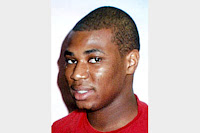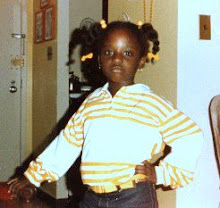At the Risk of Sounding Predictable…
Date: August 4, 2007
Beginning Time: 1:45pm
Ending Time: 2:20pm
Participant: Princeton Student (PS)

Field Note: (Playing with hair as she speaks.)
AA: Why did you select that person?
PS: Because he wasn’t afraid to die. That’s my number one reason I admire him. He wasn't afraid to die for something he believed. He utilized all of his resources to change society. By resources, I mean his education, his rhetorical skills, his influences to serve others.
AA: What are the characteristics of that person?
PS: He held strong convictions. He was confident, educated, loving, consistent and thorough.
AA: Is there one specific trait that stands out more than others?
PS: His strong convictions.
AA: Can you elaborate on that?
PS: Do you mean “what were they and why I said it”?
AA: Yes
PS: He believed very strongly in God and not only the existence of God, but also a personal God, a God who cared about the “people” and strongly invested in the people. He had strong convictions in racial and social equality. He wasn’t too wavering, although somewhat wavering about the Vietnam War. Why? That was what motivated him, his strong convictions. That’s what moved him to act. Everything revolved around his personal convictions.
AA: In general, what traits do you ascribe to someone whom you admire?
PS: Honesty is a big one. People who are honest about themselves, who take personal responsibility and hold themselves accountable. Humility is another one.
AA: Any more thoughts on “humility”?
PS: It goes hand in hand with honesty. You don’t have to beat yourself up. Just be honest with who you are.
AA: Do you think that King had those traits?
PS: Yes and no. There is evidence that he was an honest and humble person. He was a human being. I wasn’t around him. But, I’m sure there were times when he may not have been honest and humble. I’m sure that he had his prideful moments.
AA: How has that person impacted your life?
PS: I think King as well as other members of the Civil Rights movement has impacted my life because I was born into a society that is more accepting of Black people and other cultures and ethnicities- because of their sacrifices. Now that I’m older, it causes me to want to do the same for the world.
AA: How has that person impacted the life of others either in the family, community or society?
PS: I think I kind of answered that question.
AA: Do you think the youth today would admire him enough to follow him, if he were alive?
PS: Oh yes, perhaps if he were alive and spoke of issues relevant to them. The reality is that those teenagers (of the 60’s) were active in the freedom movement. The environment was conducive then. Besides, King was young and appealed to the youth.
AA: Do you think because he was young that he drew a lot of teenagers to his movement?
PS: Yes
PS: Some, but not all. Youth aren’t going to get involved in a cause unless there is a personal stake or if something is threatening their existence. I’m not talking about something subliminal. It has to be pervasive- looking them right in the face. AA: What concerns you most about whom and how young people choose role models?
PS: The selfish choosing of role models. It seems to be self-motivated. If someone chose a Dr. King, it was because he helped others, selfless motives. Many youth today choose role models because they got the bling, money, material things. They want to be like “them” for what they “got” as opposed to who thy touch, what lives they change or how they’ve bettered society.
AA: Describe how Dr. M. L. King could influence our youth.
PS: King could influence our youth today with a message of today. He would not be able to go back and use issues of the past to influence the present. He would need to be relevant- make it relevant to today’s culture. However, it is a fact that racism exists today, but it looks different.
AA: How can we teach our youth about the significance of Dr. M. L. King?
PS: Take the historical King and make him relevant. Take from King’s life, all that encompasses him (his childhood, his education, his successes and failures) and make it personal. Allow the children to translate the information into something that is relevant and meaningful to them.
AA: Do you think learning about Dr. M. L. King will help the youth in any way? Explain.
AA: Thank you for your honesty and your thoroughness in answering the questions.

 Jessie!
Jessie!














